
📚 Migration & Governance, Nationalism, East Asia & the Koreas
🏠 https://scdenney.net/
A full day of discussion on new research covering migration, identity, and democratic attitudes. Excellent presentations and constructive feedback across all panels.


A full day of discussion on new research covering migration, identity, and democratic attitudes. Excellent presentations and constructive feedback across all panels.





-Technocratic (Dahlian): Widely accepted in 🇰🇷 & 🇹🇼, stable over time
-Military: Endorsed in 🇵🇭, rising in 🇰🇷, rejected in 🇯🇵
-Strongman: Rapid growth in 🇰🇷 & 🇹🇼; ~50% support in latest wave
-🇯🇵 again stands apart: low across all variants

-Technocratic (Dahlian): Widely accepted in 🇰🇷 & 🇹🇼, stable over time
-Military: Endorsed in 🇵🇭, rising in 🇰🇷, rejected in 🇯🇵
-Strongman: Rapid growth in 🇰🇷 & 🇹🇼; ~50% support in latest wave
-🇯🇵 again stands apart: low across all variants
-Democracy: strong support across all cases
-Technocracy: widely accepted, but stable over time
-Military rule: high in 🇵🇭 & 🇮🇩; low but rising in 🇰🇷
-Strongman rule: high & increasing in 🇰🇷 and 🇹🇼
-🇯🇵 Japan is the outlier—high democratic support, minimal elite-rule backing

-Democracy: strong support across all cases
-Technocracy: widely accepted, but stable over time
-Military rule: high in 🇵🇭 & 🇮🇩; low but rising in 🇰🇷
-Strongman rule: high & increasing in 🇰🇷 and 🇹🇼
-🇯🇵 Japan is the outlier—high democratic support, minimal elite-rule backing
Using longitudinal WVS data (1995-2020), I map support for three types of "guardianship democracy" across six Asian democracies.


Using longitudinal WVS data (1995-2020), I map support for three types of "guardianship democracy" across six Asian democracies.


They, too, find that partisans are sorting on left/right issues, especially but not only regarding North Korea and the ROK-US alliance.
www.tandfonline.com/doi/abs/10.1...
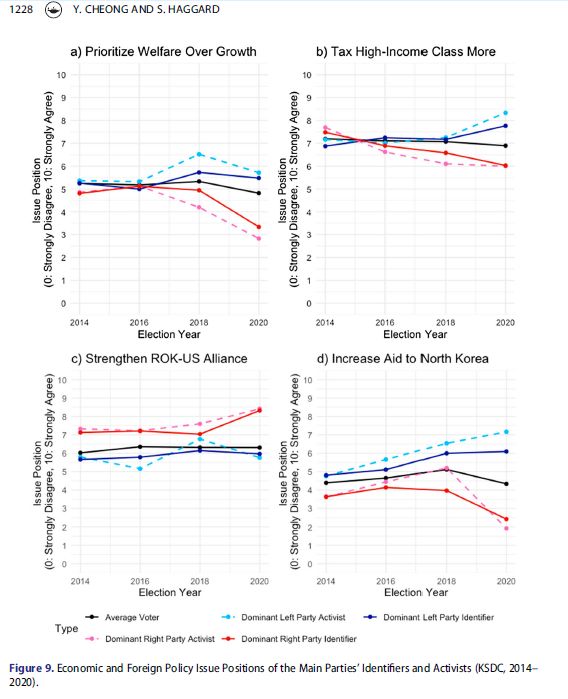
They, too, find that partisans are sorting on left/right issues, especially but not only regarding North Korea and the ROK-US alliance.
www.tandfonline.com/doi/abs/10.1...
On labor: Flexibility (conservatives) vs shorter workweek (progressives)
Social issues: Progressives are somewhat sensitive to anti-discrimination; conservatives are not.
Foreign Policy: HUGE divide.

On labor: Flexibility (conservatives) vs shorter workweek (progressives)
Social issues: Progressives are somewhat sensitive to anti-discrimination; conservatives are not.
Foreign Policy: HUGE divide.
- Conservatives prefer prosecutors, men, and Busan-based candidates.
- Progressives prefer civil society activists and are more penalty-sensitive to scandals.
But overall: policy > personality.
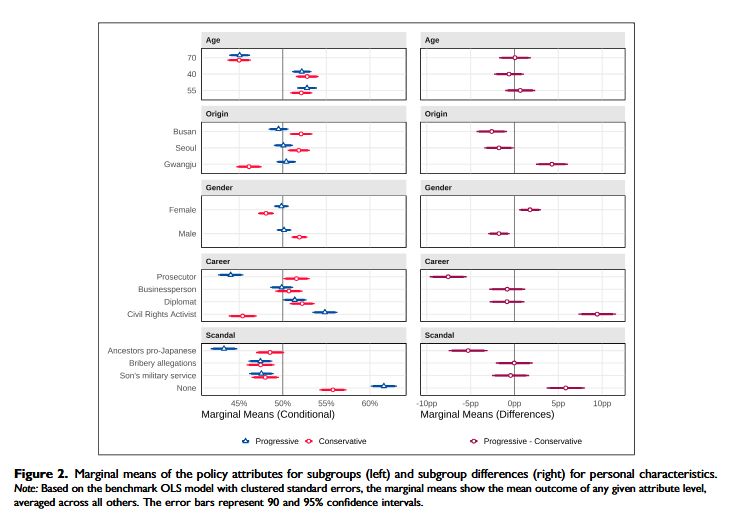
- Conservatives prefer prosecutors, men, and Busan-based candidates.
- Progressives prefer civil society activists and are more penalty-sensitive to scandals.
But overall: policy > personality.
journals.sagepub.com/doi/full/10....
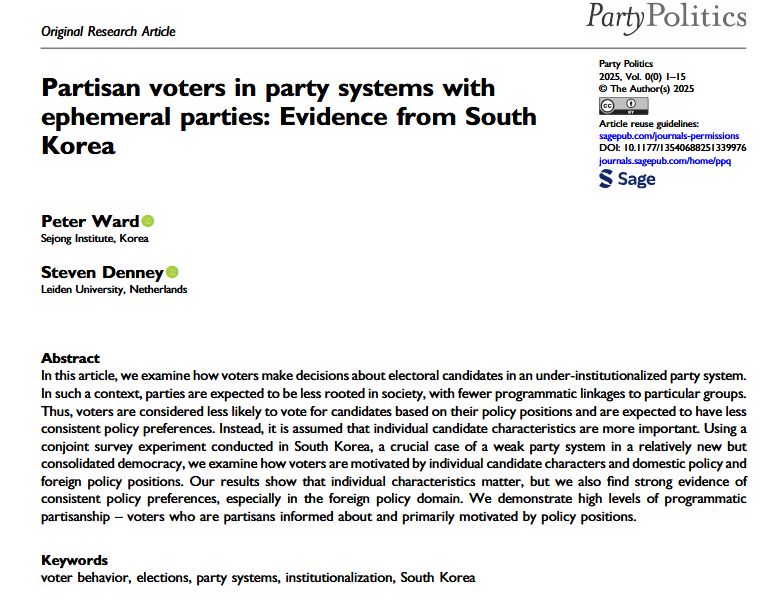
journals.sagepub.com/doi/full/10....
Support/oppose impeachment-ALL: 60/34 (+26)
-progressives: 93/5 (+88)
-conservatives: 27/69 (-42)
-18-29: 62/26 (+36)
-70+: 35/58 (-23)
-18-29 males: 52/36 (+16)
-18-29 females: 72/15 (+57)


Support/oppose impeachment-ALL: 60/34 (+26)
-progressives: 93/5 (+88)
-conservatives: 27/69 (-42)
-18-29: 62/26 (+36)
-70+: 35/58 (-23)
-18-29 males: 52/36 (+16)
-18-29 females: 72/15 (+57)
It will likely be challenging to motivate greater popular support for immigration in South Korea, but there has been no backlash (yet).
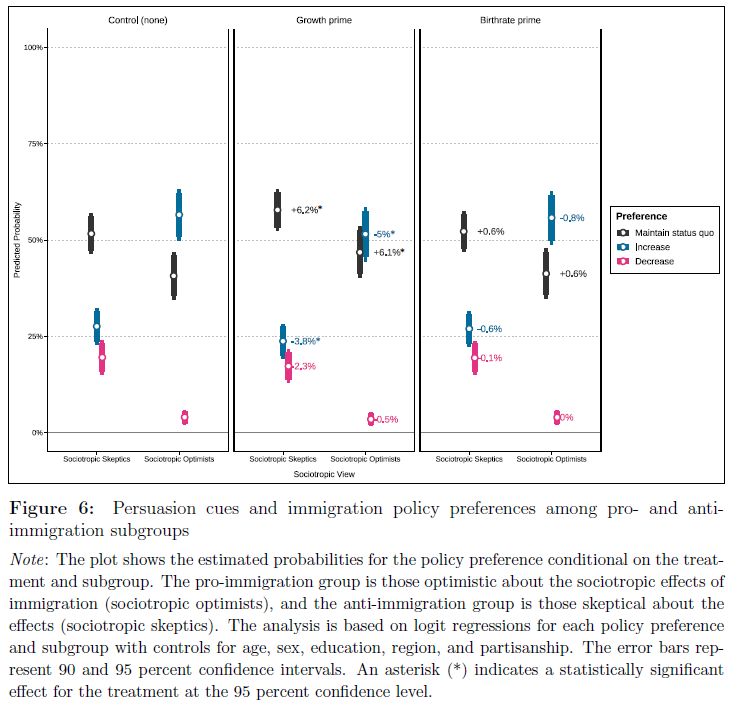
It will likely be challenging to motivate greater popular support for immigration in South Korea, but there has been no backlash (yet).




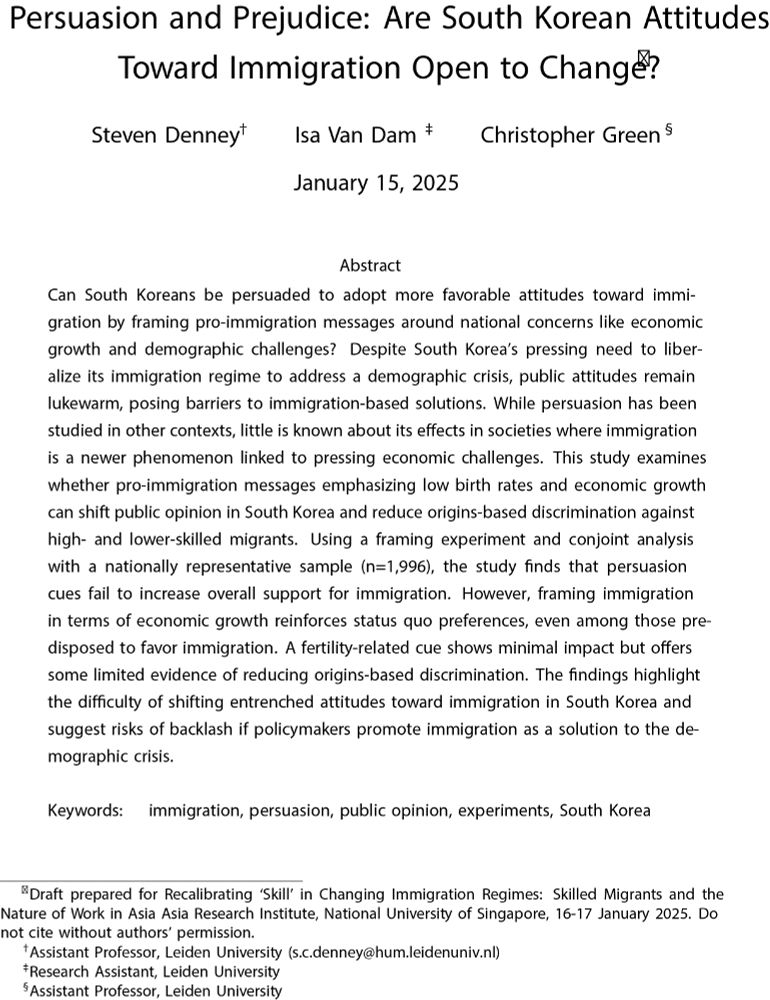

Polling agency Gongjung found that 34% of respondents polled in the first week of January support Yoon [wording: 윤석열 대통령을 어느 정도 지지하십니까?].
www.thepublic.kr/news/article...
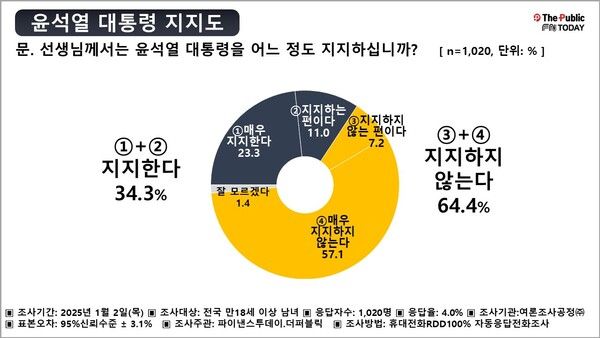
Polling agency Gongjung found that 34% of respondents polled in the first week of January support Yoon [wording: 윤석열 대통령을 어느 정도 지지하십니까?].
www.thepublic.kr/news/article...
www.gallup.co.kr/gallupdb/rep...
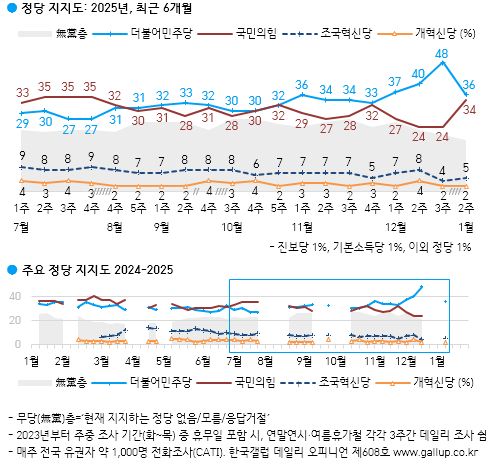
www.gallup.co.kr/gallupdb/rep...
www.journalofdemocracy.org/articles/why...

www.journalofdemocracy.org/articles/why...



Further, at ~20%, support for military rule in South Korea is, within its peer group, the upper bound.


Further, at ~20%, support for military rule in South Korea is, within its peer group, the upper bound.

